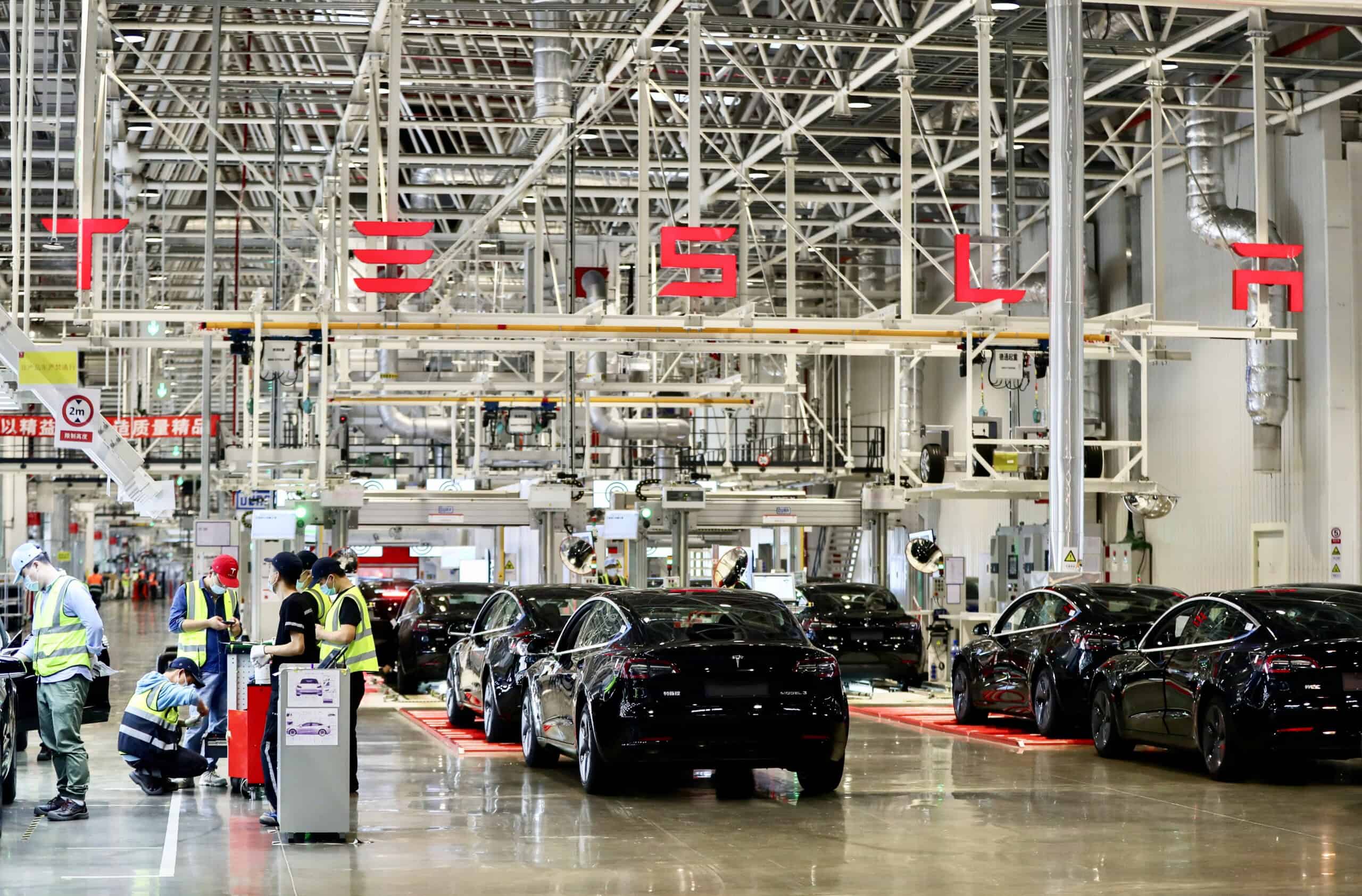- Chinese manufacturers are demanding as much as 50 percent upon signing a contract for badly needed personal protective equipment and the other 50 percent before the goods are handed over. — The Wall Street Journal
- Macau casino operators are expected to show a 95 percent drop in their earnings before interest, tax, depreciation and amortization for the first quarter. — Bloomberg News
- Unit sales of fully electric vehicles more than doubled in Europe in the first quarter compared with the first quarter of 2019. In China, sales fell by more than half in the quarter because of the lockdown. — Bloomberg News
- China’s biggest tissue and toilet paper maker, Vinda International Holdings, posted its most profitable quarter since 2015. Net profit rose by 65 percent. — South China Morning Post

Credit: Aleksandra Sova, Shutterstock
Quote of the Week
China’s social security system has failed to serve its purpose when it is needed the most.
Li Zhen, a professor at Renmin University in Beijing who specializes in social security.
No Quick Recovery Ahead
The worst of the coronavirus pandemic may be over, but the Chinese economy is still under great stress and is not yet nearing a rebound. The main problem: a liquidity shortage in the private sector, which accounts for more than half of China’s GDP.
Facing cash flow restraints, private businesses will need to reduce investment and hiring, weakening consumer confidence and reinforcing a cycle of deflation.
How much help the government will offer is in question. With many policy challenges on its plate, Beijing worries that too large a stimulus will lead to moral hazard and more speculative investments.
Among the signs of distress:
- As global demand ebbs, Chinese factories that supply Apple are slowing production and cutting staff.
- Many small and medium-size businesses are struggling to qualify for loans.
- The country is the world’s biggest consumer of pork and expects to see a surge in pork prices.
- With the drop in crude oil prices, the Bank of China last Wednesday suspended clients from opening new positions in its Yuanyou Bao product, which is underpinned by domestic and overseas oil futures.
A Big Hole in the Safety Net
China is struggling to help the rising ranks of the unemployed. The country doesn’t lack resources in its state-sponsored unemployment insurance program, but typically only larger, state-owned businesses offer unemployment insurance — precisely the companies that tend to keep their employees regardless of the state of the economy. Most small and medium-sized businesses don’t offer the insurance, which means their employees are being left out.
Silver Linings
Despite the gloomy economic news, there are some encouraging signs:
- Shipping rates are starting to recover.
- After a difficult first quarter, electricity consumption rebounded in the first half of April from the previous year.
- Steel production is now seen as improving, at least if a second coronavirus wave doesn’t hit.
- On a local level, Shanghai kicked off a digital infrastructure plan that it expects will bring citywide 5G coverage by the end of the year.

Credit: Ralf Roletschek / Roletschek.at
How China Is Winning on All-Important Lithium Batteries
In the United States, health care workers and factories are improvising to provide everything from face masks to critical ventilators, raising with new urgency the perennial question of why products that are invented in the U.S. end up being produced overseas.
ProPublica looks at America’s failure to establish a manufacturing base for lithium ion batteries — which are crucial for everything from electric cars to cordless drills — to offer an explanation.
Back in 2009, the Obama administration aimed to produce 40 percent of the world’s lithium ion batteries for electric vehicles by 2015. Today that number stands at about 10 percent, and according to ProPublica, by 2024, America’s share will drop to 8.2 percent. China, meanwhile, produces 72.8 percent and Europe 14.2 percent. China also controls the raw materials used in advanced batteries.
Down Moment for a Download Giant
Chinese regulators delivered a blow to the broader internet ambitions of ByteDance Inc., the creator of popular mobile apps such as TikTok.
The company, the world’s largest startup, was ordered to temporarily suspend downloads of Feishu, its nascent Slack-style office app, after the government found content from banned sites like Facebook and Twitter.
The Dawn of a Digital Currency
China has led many other countries in preparing the launch of an official digital currency. Now it is even closer to establishing the first electronic payment system run by a major central bank.
A pilot program has been introduced across four cities: Shenzhen, Suzhou, Chengdu and Xiong’an, a satellite city of Beijing.
Smartphone payments are already ubiquitous in China, and leaders hope that a government-run digital payment system will combat money laundering, gambling and terror financing.
The aim is to replace some of the cash in circulation. Other parts of the money supply, such as bank deposits and balances held by privately-run payment platforms, will not be affected, Yi Gang, the governor of China’s central bank, said last year.
MIT Splits Up With a Chinese AI firm
The Massachusetts Institute of Technology has canceled a research collaboration with a Chinese artificial intelligence company accused of supplying technology to oppress the minority Uighurs in Xinjiang.
The university did not say why it was ending the relationship with the company, iFlytek, but it had received pushback from students and staff after the arrangement began in 2018. Six months ago, the United States banned trade with six Chinese AI Companies, including iFlytek. MIT took funding from iFlytek but the company did not receive special access to the work or receive proprietary data or code, the university said.
The decision disappointed the company. “The vision of the cooperation was to build a better world with artificial intelligence together,” said Jiang Tao, a senior vice president at iFlytek.

Credit: Starbucks
Meatless Lasagna With Your Mocha Frappuccino
Beyond Meat, the plant-based food company that has been eager to break into Asian markets, got a big boost in China this week. Starbucks Corp. announced that it would roll out the company’s products at its coffee shops.
So far meat-alternative products have not taken off in China as they have in the United States and Europe. Meat is still a highly desired status symbol for the country’s rising middle class.
The world’s biggest coffee chain, which has reopened most of its stores in China, is banking on the new products to pull in curious and environmentally-conscious diners.
A Riddle on U.S. Exports
China is the biggest supplier of computer hardware to the United States. But the biggest export market for U.S. software isn’t China. Or any other country with a large population.
It is Ireland. In fact, software exports to Ireland are about eight times software exports to China.
Why is that? On his Council on Foreign Relations blog, Brad Setser walks us through the world of tax avoidance.
“Slowbalization:” The Long View
Ever since the U.S. and China began turning inward in 2008, globalization has been in retreat. Stepping back, Doug A. Irwin of the Peterson Institute for International Economics lays out five eras of modern globalization:
- 1870-1914 Industrialization and Integration
- 1914-1945 Interwar era
- 1945-1980 Postwar rebound
- 1980-2008 Liberalization
- 2008-2017 Slowbalization
The coronavirus pandemic will only add to this momentum, he writes.

Dave Smith covers international politics and business for The Wire’s Week in Review, and is the former editor of The New York Times Week in Review. @DaveSmithNY




